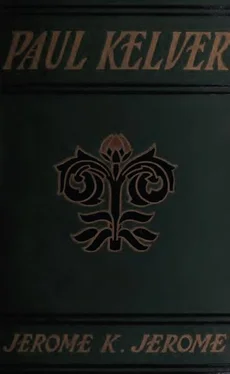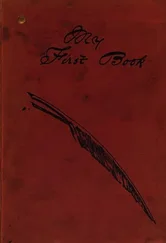Jerome Jerome - Paul Kelver
Здесь есть возможность читать онлайн «Jerome Jerome - Paul Kelver» весь текст электронной книги совершенно бесплатно (целиком полную версию без сокращений). В некоторых случаях можно слушать аудио, скачать через торрент в формате fb2 и присутствует краткое содержание. Город: New York, Год выпуска: 1902, Издательство: Dodd, Mead & Company, Жанр: Классическая проза, на английском языке. Описание произведения, (предисловие) а так же отзывы посетителей доступны на портале библиотеки ЛибКат.
- Название:Paul Kelver
- Автор:
- Издательство:Dodd, Mead & Company
- Жанр:
- Год:1902
- Город:New York
- ISBN:нет данных
- Рейтинг книги:3 / 5. Голосов: 1
-
Избранное:Добавить в избранное
- Отзывы:
-
Ваша оценка:
- 60
- 1
- 2
- 3
- 4
- 5
Paul Kelver: краткое содержание, описание и аннотация
Предлагаем к чтению аннотацию, описание, краткое содержание или предисловие (зависит от того, что написал сам автор книги «Paul Kelver»). Если вы не нашли необходимую информацию о книге — напишите в комментариях, мы постараемся отыскать её.
Paul Kelver — читать онлайн бесплатно полную книгу (весь текст) целиком
Ниже представлен текст книги, разбитый по страницам. Система сохранения места последней прочитанной страницы, позволяет с удобством читать онлайн бесплатно книгу «Paul Kelver», без необходимости каждый раз заново искать на чём Вы остановились. Поставьте закладку, и сможете в любой момент перейти на страницу, на которой закончили чтение.
Интервал:
Закладка:
And how came back Again.
I left London, the drums beating in my heart, the flags waving in my brain. Somewhat more than a year later, one foggy wet December evening, I sneaked back to it defeated—ah, that is a small thing, capable of redress—disgraced. I returned to it as to a hiding-place where, lost in the crowd, I might waste my days unnoticed until such time as I could summon up sufficient resolution to put an end to my dead life. I had been ambitious—dwelling again amid the bitterness of the months that followed my return, I write in the past tense. I had been eager to make a name, a position for myself. But were I to claim no higher aim, I should be doing injustice to my blood—to the great-souled gentleman whose whole life had been an ode to honour, to her of simple faith who had known no other prayer to teach me than the childish cry, “God help me to be good!” I had wished to be a great man, but it was to have been a great good man. The world was to have admired me, but to have respected me also. I was to have been the knight without fear, but, rarer yet, without reproach—Galahad, not Launcelot. I had learnt myself to be a feeble, backboneless fighter, conquered by the first serious assault of evil, a creature of mean fears, slave to every crack of the devil's whip, a feeder with swine.
Urban Vane I had discovered to be a common swindler. His play he had stolen from the desk of a well-known dramatist whose acquaintance he had made in Deleglise's kitchen. The man had fallen ill, and Vane had been constant in his visits. Partly recovering, the man had gone abroad to Italy. Had he died there, as at the time was expected, the robbery might never have come to light. News reached us in a small northern town that he had taken a fresh lease of life and was on his way back to England. Then it was that Vane with calm indifference, smoking his cigar over a bottle of wine to which he had invited me, told me the bald truth, adorning it with some touches of wit. Had the recital come upon me sooner, I might have acted differently; but six months' companionship with Urban Vane, if it had not, by grace of the Lord, destroyed the roots of whatever flower of manhood might have been implanted in me, had most certainly withered its leaves.
The man was clever. That he was not clever enough to perceive from the beginning what he has learnt since: that honesty is the best policy—at least, for men with brains—remains somewhat of a mystery to me. Where once he made his hundreds among shady ways, he now, I suppose, makes his thousands in the broad daylight of legitimate enterprise. Chicanery in the blood, one might imagine, has to be worked out. Urban Vanes are to be found in all callings. They commence as scamps; years later, to one's astonishment, one finds them ornaments to their profession. Wild oats are of various quality, according to the soil from which they are preserved. We sow them in our various ways.
At first I stormed. Vane sat with an amused smile upon his lips and listened.
“Your language, my dear Kelver,” he replied, my vocabulary exhausted, “might wound me were I able to accept you as an authority upon this vexed question of morals. With the rest of the world you preach one thing and practise another. I have noticed it so often. It is perhaps sad, but the preaching has ceased to interest me. You profess to be very indignant with me for making use of another man's ideas. It is done every day. You yourself were quite ready to take credit not due to you. For months we have been travelling with this play: 'Drama, in five acts, by Mr. Horace Moncrieff.' Not more than two hundred lines of it are your own—excellent lines, I admit, but they do not constitute the play.”
This aspect of the affair had not occurred to me. “But you asked me to put my name to it,” I stammered. “You said you did not want your own to appear—for private reasons. You made a point of it.”
He waved away the smoke from his cigar. “The man you are posing as would never have put his name to work not his own. You never hesitated; on the contrary, you jumped at the chance of so easy an opening to your career as playwright. My need, as you imagined it, was your opportunity.”
“But you said it was from the French,” I argued; “you had merely translated it, I adapted it. I don't defend the custom, but it is the custom: the man who adapts a play calls himself the author. They all do it.”
“I know,” he answered. “It has always amused me. Our sick friend himself, whom I am sure we are both delighted to welcome back to life, has done it more than once, and made a very fair profit on the transaction. Indeed, from internal evidence, I am strongly of opinion that this present play is a case in point. Well, chickens come home to roost: I adapt from him. What is the difference?”
“Simply this,” he continued, pouring himself out another glass of wine, “that whereas, owing to the anomalous state of the copyright laws, stealing from the foreign author is legal and commendable, against stealing from the living English author there is a certain prejudice.”
“And the consequences, I am afraid, you will find somewhat unpleasant,” I suggested.
He laughed: it was not a frivolity to which he was prone. “You mean, my dear Kelver that you will.”
“Don't look so dumbfounded,” he went on. “You cannot be so stupid as you are pretending to be. The original manuscript at the Lord Chamberlain's office is in your handwriting. You knew our friend as well as I did, and visited him. Why, the whole tour has been under your management. You have arranged everything—most excellently; I have been quite surprised.”
My anger came later. For the moment, the sudden light blinded me to everything but fear.
“But you told me,” I cried, “it was only a matter of form, that you wanted to keep your name out of it because—”
He was looking at me with an expression of genuine astonishment. My words began to appear humorous even to myself. I found it difficult to believe I had been the fool I was now seeing myself to have been.
“I am sorry,” he said, “I am really sorry. I took you for a man of the world. I thought you merely did not wish to know anything.”
Still, to my shame, fear was the thing uppermost in my heart. “You are not going to put it all on to me?” I pleaded.
He had risen. He laid his hand upon my shoulder. Instead of flinging it off, I was glad of its kindly pressure. He was the only man to whom I could look for help.
“Don't take it so seriously,” he said. “He will merely think the manuscript has been lost. As likely as not, he will be unable to remember whether he wrote it or merely thought of writing it. No one in the company will say anything: it isn't their business. We must set to work. I had altered it a good deal before you saw it, and changed all the names of the characters. We will retain the third act: it is the only thing of real value in the play. The situation is not original; you have as much right to dish it up as he had. In a fortnight we will have the whole thing so different that if he saw it himself he would only imagine we had got hold of the idea and had forestalled him.”
There were moments during the next few weeks when I listened to the voice of my good angel, when I saw clearly that even from the lowest point of view he was giving me sound advice. I would go to the man, tell him frankly the whole truth.
But Vane never left my elbow. Suspecting, I suppose, he gave me clearly to understand that if I did so, I must expect no mercy from him. My story, denounced by him as an outrageous lie, would be regarded as the funk-inspired subterfuge of a young rogue. At the best I should handicap myself with suspicion that would last me throughout my career. On the other hand, what harm had we done? Presented in some twenty or so small towns, where it would soon be forgotten, a play something like. Most plays were something like. Our friend would produce his version and reap a rich harvest; ours would disappear. If by any unlikely chance discussion should arise, the advertisement would be to his advantage. So soon as possible we would replace it by a new piece altogether. A young man of my genius could surely write something better than hotch-potch such as this; experience was all that I had lacked. As regarded one's own conscience, was not the world's honesty a mere question of convention? Had he been a young man, and had we diddled him out of his play for a ten-pound note, we should have been applauded as sharp men of business. The one commandment of the world was: Don't get found out. The whole trouble, left alone, would sink and fade. Later, we should tell it as a good joke—and be laughed with.
Читать дальшеИнтервал:
Закладка:
Похожие книги на «Paul Kelver»
Представляем Вашему вниманию похожие книги на «Paul Kelver» списком для выбора. Мы отобрали схожую по названию и смыслу литературу в надежде предоставить читателям больше вариантов отыскать новые, интересные, ещё непрочитанные произведения.
Обсуждение, отзывы о книге «Paul Kelver» и просто собственные мнения читателей. Оставьте ваши комментарии, напишите, что Вы думаете о произведении, его смысле или главных героях. Укажите что конкретно понравилось, а что нет, и почему Вы так считаете.












